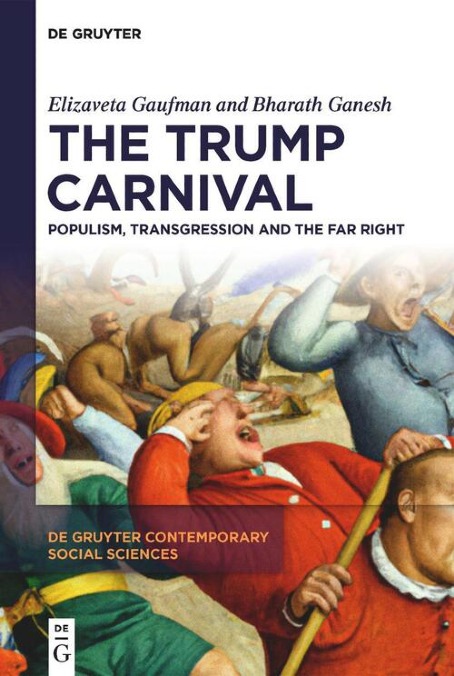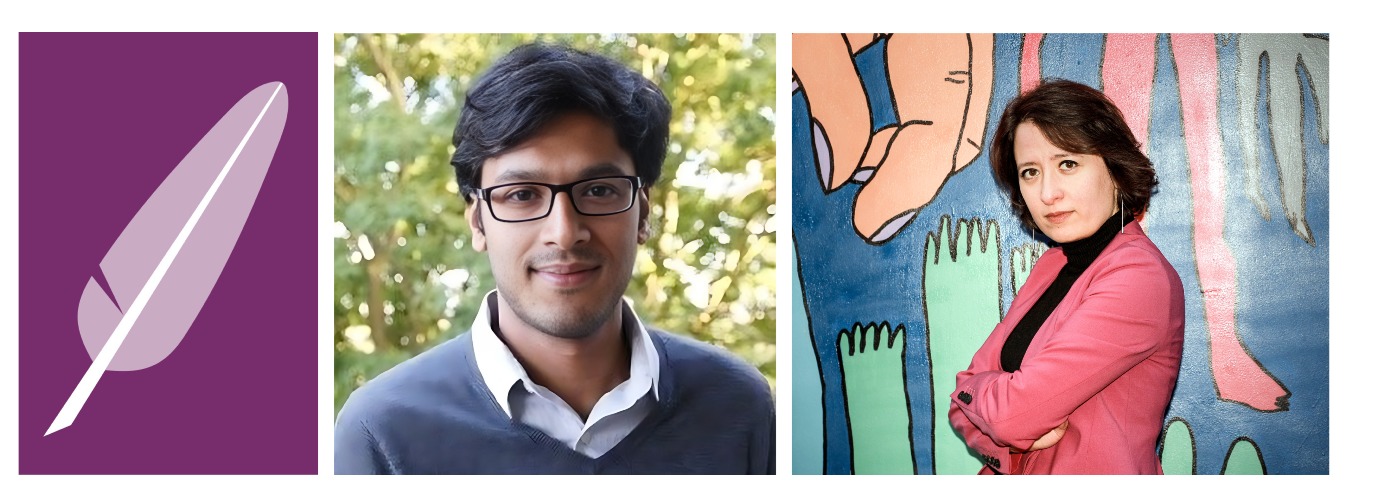‘Normoverschrijding is de aantrekkingskracht van Trump.’ | Interview met dr. Lisa Gaufman en dr. Bharath Ganesh
Interview: Jelle Posthuma
Dr. Lisa Gaufman is academic lead van de research groep Populism & Extremism van de Rudolf Agricola School for Sustainable Development
In het boek ' The Trump Carnival ', dat 29 februari officieel wordt gepresenteerd in het Academiegebouw van de Rijksuniversiteit Groningen, trekken onderzoekers Lisa Gaufman en Bharath Ganesh een vergelijking tussen de Amerikaanse voormalige president Donald Trump en het middeleeuwse carnaval. ‘Tijdens carnaval greep ‘het volk’ de macht, maar voor veel minderheden was het een wreed feest.’
Onlangs suggereerde Trump tijdens een campagnebijeenkomst dat hij Rusland ‘zou aanmoedigen om te doen wat het maar wil’ tegen een NAVO-lid ‘dat niet betaalt’. Volgens een Volkskrant-correspondent reageerden Amerikaanse burgers gelaten. ‘Amerikanen die Trump niet zien zitten, zijn murw geslagen door zijn uitspraken. Daardoor nemen ze hem minder serieus en worden extreme uitlatingen als deze normaal. Dat is heel zorgelijk.’

The Trump Carnival - Populism, Transgression and the Far Right gaat over deze normalisatie.
In hun boek maken onderzoekers dr. Lisa Gaufman (RUG) en dr. Bharath Ganesh (UvA) de balans op: wat heeft Trump de afgelopen jaren allemaal gezegd en gedaan, en hoe zijn Trumps uitspraken genormaliseerd in het Amerikaanse politieke discours?
‘Voor Trumps aanhangers zit zijn aantrekkingskracht in het overschrijden van normen, die liberale democratieën sinds de Tweede Wereldoorlog bijeenhouden’, vertelt Ganesh. ‘Zijn opmerking over NAVO-landen was daar het zoveelste voorbeeld van.’

|
dr. Lisa Gaufman is an Assistant Professor of Russian Discourse and Politics at the University of Groningen (UG). Her research is situated on the intersection of political theory, international relations, media and cultural studies.
dr. Bharath Ganesh is an Assistant Professor of Media Studies at the University of Amsterdam (UvA). His research focusses on disinformation, extremism, and technology. |
Gaufman en Ganesh noemen Trumps uitspraken ‘carnavalesk’. ‘Hij doet zijn uitspraken consequent af als een grap’, vertelt Ganesh. ‘Hij gebruikt hierbij zeer informele en agressieve taal. Ook zijn inconsistentie is carnavalesk. Trump zegt: NAVO-landen moeten betalen, terwijl hij zelf berucht is om zijn pogingen om onder facturen uit te komen.’
Middeleeuws carnaval
Het theoretische ‘raamwerk’ van The Trump Carnival is afkomstig van Mikhail Bakhtin, een Russische literatuurcriticus. In zijn proefschrift behandelt Bakhtin teksten van de Franse humanist Rabelais, waarin carnaval in de Middeleeuwen centraal staat. Tijdens carnaval wist de bevolking tijdelijk de macht te grijpen en gelden de regels van de kerk niet meer, vertelt Gaufman. ‘In zijn werk kijkt Bakhtin in het bijzonder naar de ‘lachcultuur’ van het volk: hoe gewone mensen tijdens carnaval grappen maken, de rollen omkeren en de heersende macht tijdelijk belachelijk maken.’
Bakhtin is erg geïnspireerd door de manier waarop ‘het gewone volk’ de macht wist te grijpen tijdens carnaval. Maar Bakhtin heeft volgens Gaufman en Ganesh een erg geïdealiseerd beeld van het middeleeuwse volksfeest. ‘Carnaval gaf ook ruimte aan het vernederen van minderheidsgroepen, zoals de Joodse bevolking’, vertelt Gaufman. ‘Verschillende critici wijzen daarnaast op de misogyne uitingen tijdens carnaval. Vrouwen werden bijvoorbeeld belachelijk gemaakt als seksueel losbandig of voorgesteld als "zwangere oude wijven". Voor veel minderheden was carnaval vooral een wreed feest.’
De twee onderzoekers trekken in hun boek de vergelijking tussen het middeleeuwse carnaval en het fenomeen Trump. ‘Ook bij Trump maakt een meerderheidscultuur grappen ten koste van minderheden’, weet Gaufman. ‘Dat maakt het zo gevaarlijk. Als een politicus een grap maakt over Mexicanen, is dat niet onschuldig. Het draagt bij aan de normalisatie van het extreemrechtse politieke discours.’

‘Fascistische transgressie’
In het boek staat transgressie, oftewel het overschrijden van normen, centraal. ‘Tijdens carnaval wordt het overschrijden van normen tijdelijk toegestaan’, legt Ganesh uit. ‘Er is een ruimte waar alle normale regels niet meer gelden. In de recente geschiedenis leidde transgressie tot goede ontwikkelingen, denk aan de burgerrechtenbeweging in de jaren zestig. We zijn ook zeker niet tegen het overschrijden van normen; het gaat erom welke normen worden overschreden. Bij Trump gaat het bij transgressie niet om gelijkheid, maar om wreedheid, superioriteit en macht.’
De opkomst van Trump en vergelijkbare politici wereldwijd wordt door politieke duiders vaak beschreven als populisme. ‘De term populisme doet vermoeden dat een meerderheid van de bevolking achter dergelijke populisten staat’, zegt Ganesh. ‘Dit is niet het geval. Een meerderheid van de Amerikanen is tegen Trump. Populisme gaat volgens ons meer over het creëren van een beeld van een ‘down-to-earth’ buitenstaander die de normen van de gevestigde orde overschrijdt.’
Tijdens het carnaval van Trump gaat het volgens Gaufman en Ganesh om ‘fascistische transgressie’. De uitspraken van de oud-president richten zich veelal tegen kwetsbare groepen’, zegt Ganesh. ‘Trump zei onlangs dat immigranten 'het bloed van ons land vergiftigen'. Deze inhumane uitspraken waren totaal onacceptabel in liberale democratieën, maar Trump heeft deze vorm van transgressie genormaliseerd.’ Gaufman benadrukt dat de ‘carnavalsbende’ zich net zo goed tegen medestanders kan keren. ‘Kijk naar ex-vicepresident Mike Pence, een fervent Trumpaanhanger, tijdens de bestorming van het Capitool. Ze wilden hem ophangen.’
Digitaal carnavalsplein
Sociale media speelden een belangrijke rol bij de opkomst van Trump, weten de twee onderzoekers. Trump was een grootgebruiker van Twitter, waardoor hij in direct contact stond met zijn publiek. Ook hier trekken Ganesh en Gaufman een vergelijking met het carnaval. ‘Het middeleeuwse carnavalsfeest vond plaats op een plein, waar mensen met elkaar in contact kwamen. De omgangsvormen op dit plein waren informeel, omdat de vaste normen niet langer golden tijdens carnaval.’
Op sociale media gebeurt hetzelfde, vervolgt Gaufman. ‘Het is een digitaal carnavalsplein, waar mensen elkaar ontmoeten en zich kunnen voordoen als iemand anders.’ Bedrijven achter de sociale media platforms grijpen nauwelijks in op het digitale carnavalsplein, waardoor de drempel om normen te overschrijden erg laag wordt, stellen de twee onderzoekers. Digitale media maken bovendien een einde aan de tijdelijkheid van carnaval. ‘Een carnavaleske tweet blijft voor altijd bestaan’, zegt Ganesh.
In Nederland ziet Gaufman de carnavaleske politiek vooral terug bij Forum voor Democratie. ‘Ook de retoriek van Thierry Baudet werd genormaliseerd door de Nederlandse media. Het ging vooral over zijn kledingkeuze en piano’, verzucht de onderzoeker. Volgens Ganesh is het carnavaleske van Trump uniek. Maar dat geldt niet voor de transgressie van democratische normen, weet hij. ‘Bij de coalitieonderhandelingen gaat het over de vraag of Geert Wilders de rechtsstaat en grondrechten wil waarborgen; dat zegt volgens mij genoeg.’
Het verdedigen van democratische waarden vraagt om een ruggengraat, vervolgt Ganesh. De onderzoeker stelt dat de media de afgelopen jaren slecht werk hebben geleverd. ‘Journalisten zijn zo gefocust op objectiviteit en balans, dat ze mensen aan het woord laten die daar niets om geven.’ Gaufman vult hem aan: ‘Kranten beschrijven de mogelijke nieuwe coalitie met de PVV als centrum rechts, maar dat klopt niet. Benoem het zoals het is: het is extreemrechts.’
Boekpresentatie
De boekpresentatie van The Trump Carnival, in samenwerking met de Rudolf Agricola School for Sustainable Development, vindt plaats op 29 februari om 16.00 uur in het Academiegebouw. Inschrijven kan via dit formulier .
Download The Trump Carnival
Het boek is volledig te downloaden: open access
Podcast
In Science Podcast - Lisa Gaufman: The Trump Carnival & Transgression in Politics
Meer nieuws
-
14 februari 2026
Tumor weg, maar waar zijn de woorden?
-
19 januari 2026
Digitalisering drijft kansarme burgers soms in het nauw

